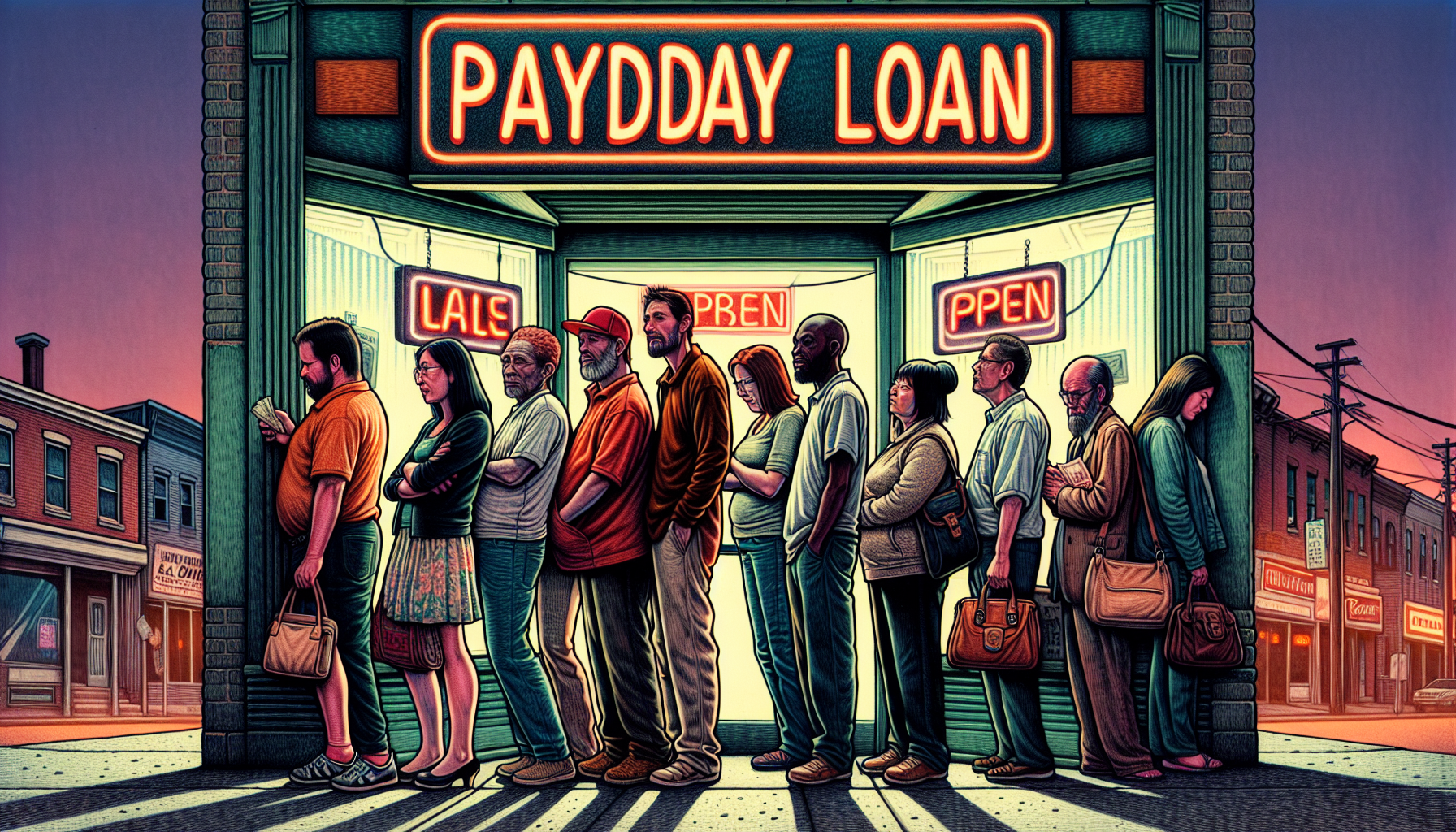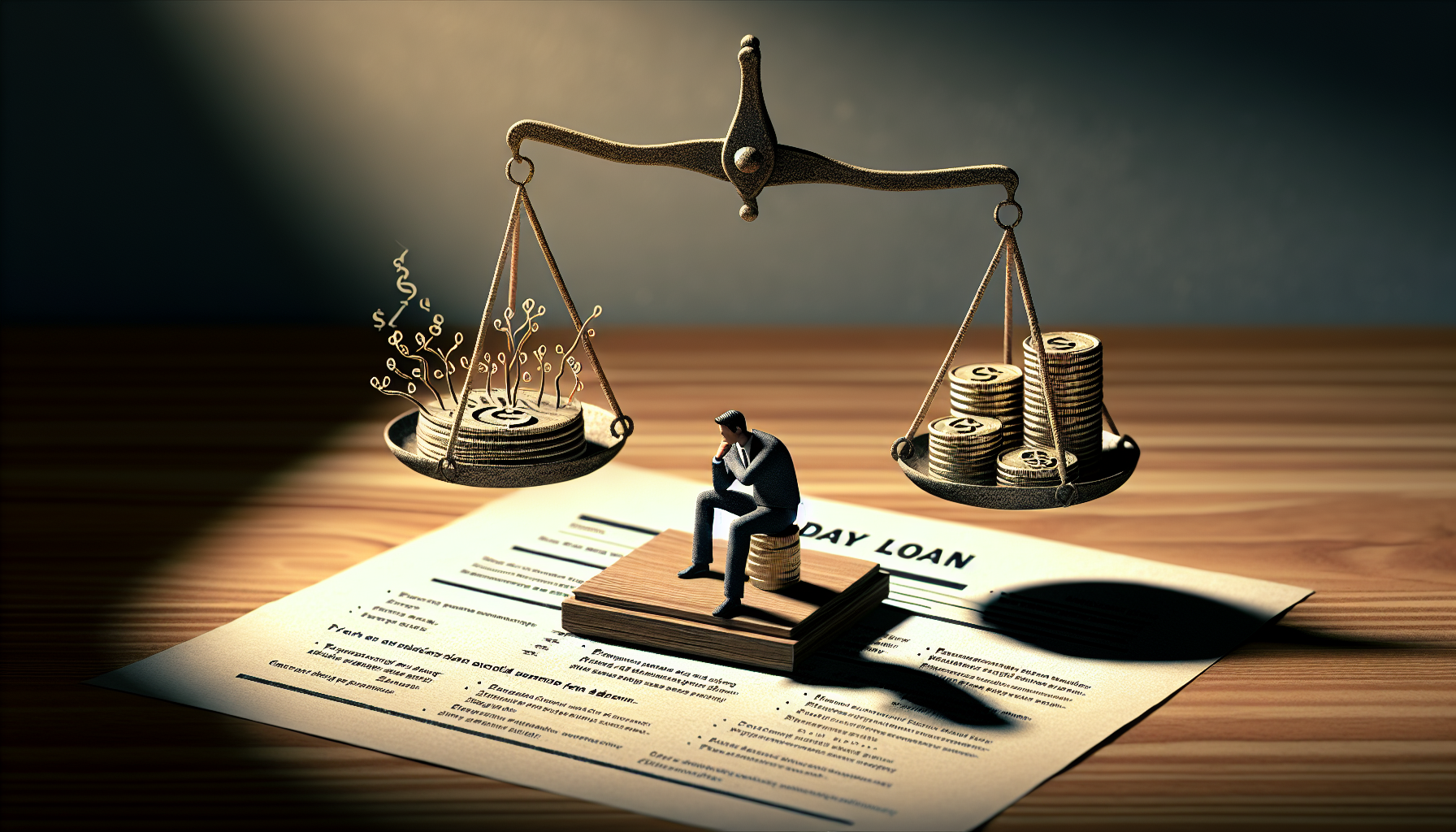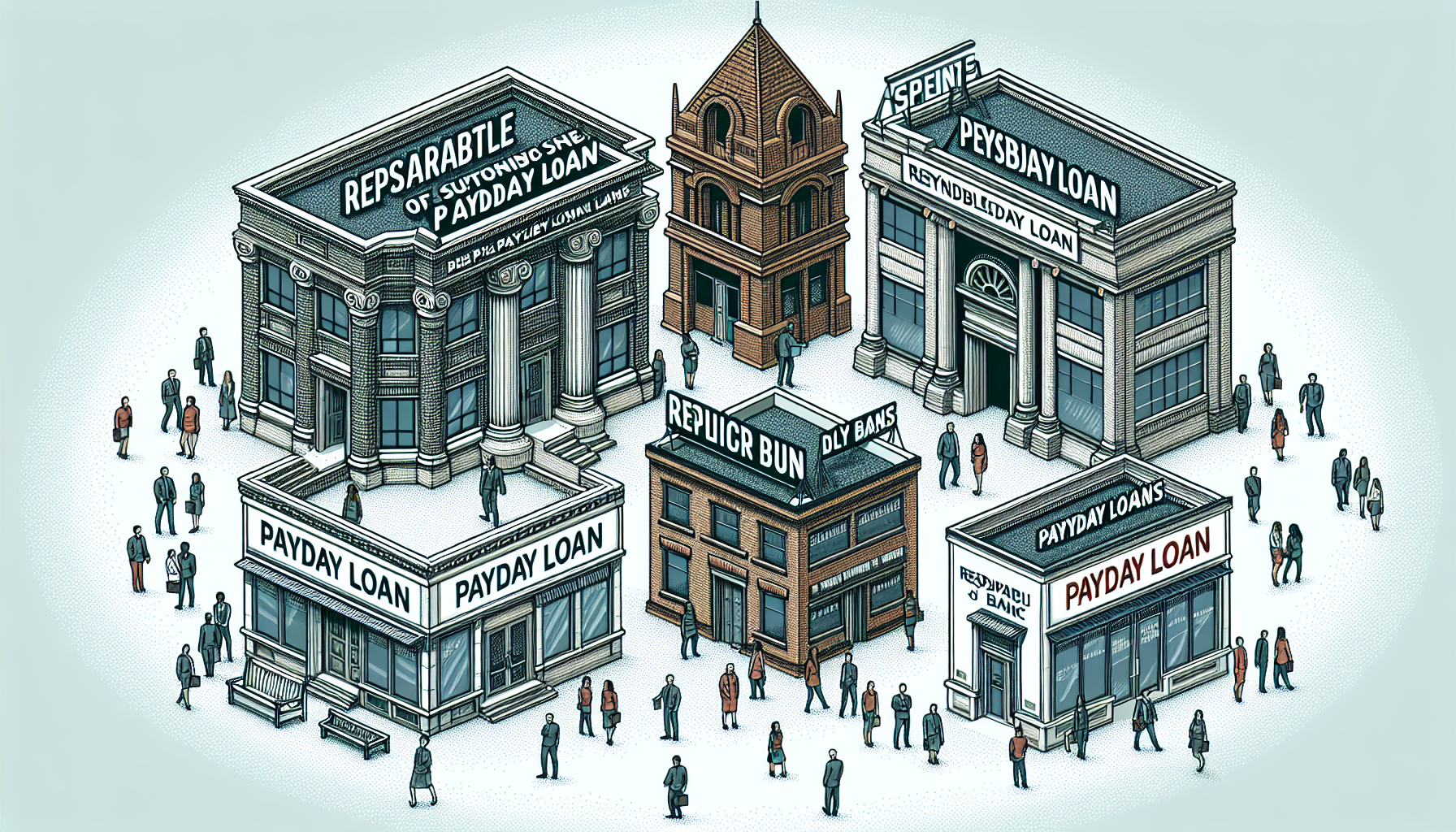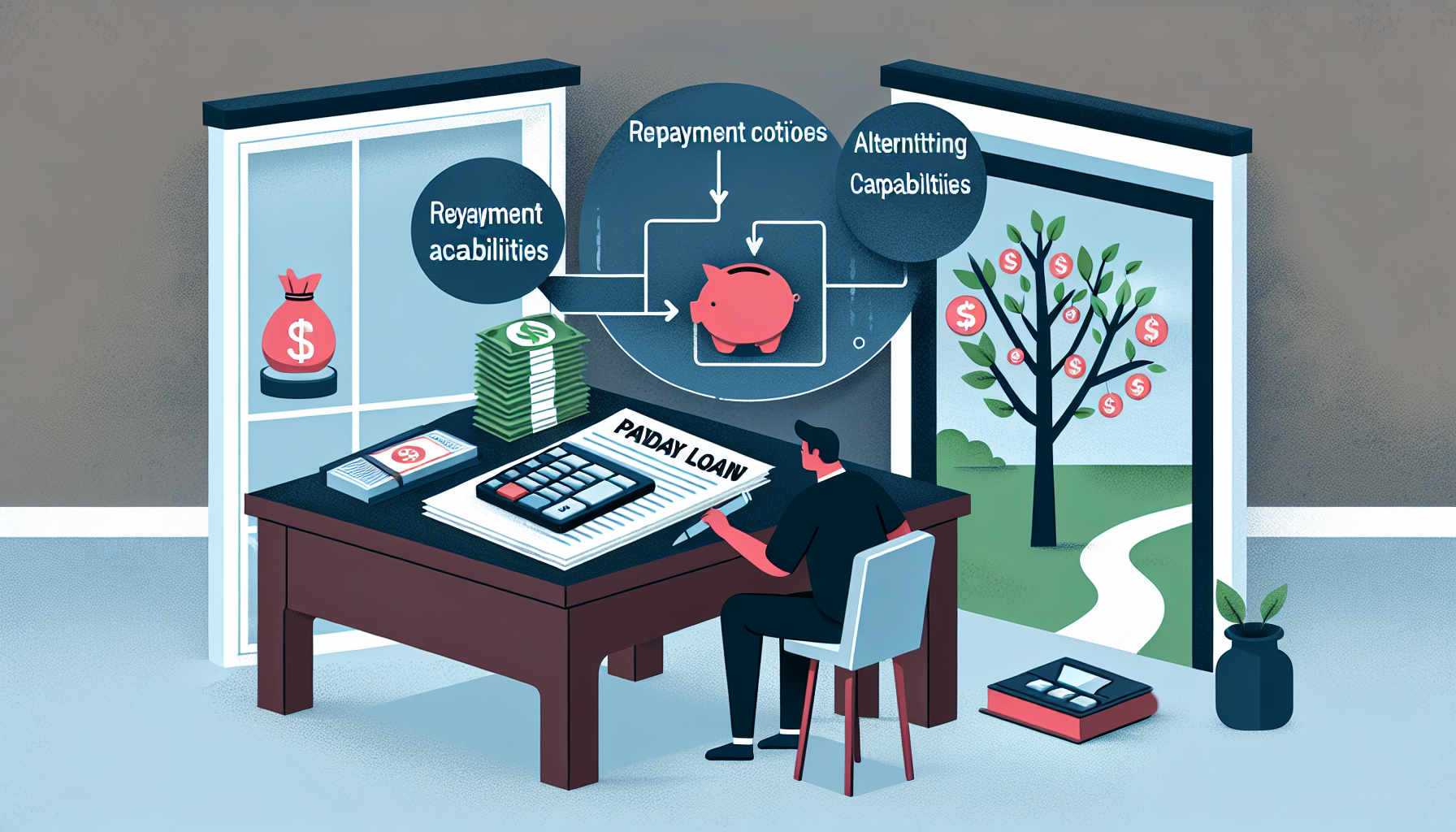When an unexpected expense arises before payday, a payday loan might seem like the solution. These loans are designed for short-term financial relief, typically until the next paycheck arrives. Quick to access and easy to qualify for, payday loans can be a tool for urgent financial needs. For individuals seeking bad credit loans, payday loans present an accessible option regardless of credit history. This article unpacks the mechanics, advantages, and risks of payday loans, and how to navigate them wisely without sailing into a debt trap.
Key Takeaways
-
Payday loans offer quick cash and are accessible to those with poor or no credit, but come with high-interest rates and a potential debt cycle due to expensive rollovers and fees.
-
Understanding how payday loans work, including state regulations, interest rates (often expressed as an APR), and repayment terms, is crucial when considering this type of financing option.
-
To responsibly use payday loans, borrowers should assess their ability to repay on time, avoid rollovers to prevent debt cycles, and explore alternatives with more favorable terms, such as credit unions or installment loans.
Understanding Payday Loans

Picture this. You’re hit with an unexpected expense — your car breaks down, or a medical bill arrives out of the blue. You’re short on cash and payday is still a week away. A payday loan could be your lifeline. Payday loans are small-dollar loans, typically less than $1,000, designed to tide you over until your next paycheck. They’re marketed as immediate solutions to short-term cash needs, like:
-
covering rent
-
utilities
-
food
-
medical bills
Additionally, payday loans are accessible to individuals with poor or unestablished credit history, making them a viable form of loans for bad credit.
But, just as every coin has two sides, so do payday loans. They’re quick and easy, yes. But they also come with a catch. Payday loans are governed by state regulations, which can significantly affect their cost. Some states have imposed caps on interest rates, reducing the overall cost of the loan.
Understanding the landscape of payday loans is as crucial as a sailor comprehending sea currents for effective navigation.
How do payday loans work?
What’s the best approach to navigating the payday loan landscape? It starts with understanding how payday loans work. To apply for a payday loan, you need to provide proof of income and your bank account details. Pay stubs and ID are often required for in-store applications.
Once approved, the loan is typically repaid with your next paycheck within two to four weeks. This is usually done through a post-dated check or electronic withdrawal authorization from your bank account.
But here’s where you need to pay attention. The cost of a payday loan is usually presented both as a fee, typically $10 to $30 per $100 borrowed, and an equivalent annual percentage rate (APR). That’s right, an APR. So, while payday loans might seem like a quick fix, they can be expensive in the long run if not managed properly.
Benefits of payday loans
Although payday loans may seem like an impending storm, they also have their bright sides. One of the biggest advantages of payday loans is their speed. They offer quick access to money, often providing funds on the same day of application. This can be a lifesaver when you’re in a pinch and need cash fast.
Another boon of payday loans is their accessibility. Unlike other loans that require a credit check, payday loans are accessible to individuals with poor or unestablished credit history. This opens up a world of possibilities for individuals who might not qualify for traditional loans due to a low credit score or lack of credit history. It’s akin to uncovering a hidden treasure in the vast sea of financial options.
Drawbacks of payday loans
But just as every treasure chest may have its share of curses, so do payday loans have their drawbacks. One of the biggest pitfalls of payday loans are their exceptionally high-interest rates. These rates average around 391%, but can potentially surpass a whopping 600%. The annual percentage rate (APR) for payday loans suggests an exorbitantly high cost to the borrower. It’s comparable to a boat with a hole, where the water, in this case, your money, keeps draining out.
Another pitfall to watch out for is the potential debt cycle. Rollover fees and subsequent loans taken to cover previous payday loan debts can trap borrowers in a cycle of debt. Additional fees can accrue when the due date is extended, leading to a scenario where the borrower owes more in fees than the initial loan amount.
Lastly, defaulting on a payday loan can result in the debt being sold to a collections agency or reported to credit bureaus, potentially harming the borrower’s credit score. Navigating through a storm without a compass is a fitting analogy here, as you could end up lost, or worse, complicate your financial situation further.
Types of Payday Loans

The types of payday loans are as vast and varied as the sea. Each type has its own unique features, and understanding these can help you choose the right payday loan for your needs.
Payday loans are a major category of online loans, alongside personal loans, installment loans, and lines of credit. Additionally, some payday loan providers might offer secured loans as an alternative to the more common unsecured payday loans, offering potentially lower interest rates and the flexibility to choose the payment due date.
Online payday loans from online lenders
An increasingly popular type of payday loan is the online payday loan, offered by online lenders. These loans provide convenience and accessibility, allowing borrowers to apply for and receive a loan without leaving their homes.
Online payday loans are generally:
-
Short-term
-
High-cost loans
-
Primarily intended for amounts up to $500
-
Usually due on the next payday of the borrower.
The repayment date for an online payday loan is commonly between two to four weeks from the issuance of the loan. Lenders typically expect the loan to be repaid through a single lump-sum payment, often by a post-dated check or by electronic withdrawal from the borrower’s bank account.
However, the cost for an online payday loan can vary, with many states setting the fees between $10 to $30 for every $100 borrowed. Some online payday loans may be structured for repayment in installments over a longer period rather than in a single lump-sum payment. Keep in mind, state laws significantly influence the availability, terms, and regulations of online payday loans; some states even ban them entirely.
No credit check payday loans for bad credit
Another type of payday loan is the no credit check payday loan. These loans cater specifically to individuals with poor or no credit history. The benefits of no credit check payday loans include:
-
Broader access for individuals who might not qualify for traditional loans
-
Quick and easy application process
-
Fast approval and funding
-
No need to worry about credit history or credit score
These bad credit loans, including home equity loans, secured loan options, and unsecured loans, can be a helpful option for those who need immediate financial assistance but have a less-than-perfect credit history, often resulting from a bad credit score. Debt consolidation can be one of the reasons for seeking such loans.
In the case of no credit check payday loans, loan approval is based on income frequency rather than a minimum credit score. This makes these loans a viable option for those who have been turned down by traditional lenders due to their credit history. For those rejected by traditional lending’s choppy waters, it’s akin to finding a safe harbor in a storm.
Direct lender payday loans
Finally, there are direct lender payday loans. These loans are offered directly by lenders, not through a third party. This allows for quicker loan processing as they operate via the internet and eliminate the additional steps involved with brokers.
Borrowing directly from a lender can potentially reduce fees associated with payday loans by eliminating costs linked to middlemen and brokers. It’s similar to having a direct conversation with a ship’s captain, where you get answers straight from the source, bypassing intermediaries.
Choosing the Right Payday Loan

Once you understand the different types of payday loans, the next step is choosing the right one for your needs. This is a crucial step, as the right payday loan can be a helpful tool in your financial arsenal, while the wrong one can lead to a cycle of debt. Interest rates, fees, and repayment terms are crucial factors to consider when selecting a payday loan.
Comparing different payday loan offers is a helpful strategy to find the most favorable terms. Consider it similar to shopping for a new boat — you wouldn’t impulsively purchase the first one you see, would you? You’d compare prices, features, and reviews before making your decision. The same goes for payday loans.
Conducting thorough research before applying can lead to a hassle-free experience in obtaining a payday loan. Consider it akin to plotting your course before embarking — a small amount of preparation can significantly smooth your journey.
Factors to consider
When choosing a payday loan, there are several factors to consider. First and foremost, look at the APR. Choosing a lender with a lower APR means the loan will cost less over time because the APR includes the interest rate and any additional fees.
Another factor to consider is potential additional costs for payday loans, such as administrative costs, late payment fees, and origination fees. It’s also important to remember that most payday loans are expected to be repaid within a two-week period, which can pose challenges for borrowers unable to meet this short-term obligation.
Lastly, be aware of state regulations limiting fees or interest rates that payday lenders can charge. Some states have even banned payday loans entirely. Knowing the rules of the sea is a fitting comparison — understanding the laws and regulations can help you navigate safely and evade potential hazards.
Comparing payday loan offers
Once you’ve identified the factors to consider, the next step is to compare payday loan offers. Comparing finance charges is a crucial step when reviewing different payday loan offers. Finance charges on payday loans can range from 15 to 30 percent of the borrowed amount, which must be presented as an Annual Percentage Rate (APR).
As you compare offers, also be on the lookout for signs of a shady lender. Unrealistic promises, requests for upfront payment, and the use of unsecured websites are all red flags that should raise your suspicions. It’s similar to staying alert for pirates on the high seas — vigilance can help you steer clear of potential dangers, ensuring a safer journey.
Top Payday Loan Providers

Now that you’ve grasped how to select a payday loan, let’s explore the top payday loan providers. Much like every sea has its finest captains, the payday loan industry boasts its top providers. We’ll cover a few providers that offer varied features and requirements, such as:
-
LendingClub
-
Upgrade
-
Upstart
-
Avant
Provider 1
First up is OppLoans. This provider does not require a minimum FICO or Vantage credit score and considers alternative credit data and banking history for eligibility. This is a significant advantage for individuals with less-than-perfect credit, as it opens up a world of possibilities for obtaining a payday loan.
OppLoans also takes a unique approach to lending, with a focus on improving financial health for those with poor credit backgrounds. It’s akin to having a captain who not only steers the ship but also instructs you on sailing. This emphasis on financial literacy and empowerment sets OppLoans apart from other providers.
Provider 2
Next, we have Upstart. This provider stands out by using various factors beyond just credit score for evaluating loan applicants. This broader approach to evaluating applicant’s eligibility makes Upstart a viable option for individuals who may not qualify for loans based on credit score alone.
Upstart offers the following loan options:
-
Repayment terms of 36 and 60 months
-
Higher origination fees and a higher maximum APR
-
Some loans can be secured with a vehicle, adding another layer of flexibility to their offerings.
Provider 3
Last but not least, we have Avant. Avant caters to borrowers with less-than-perfect credit and offers shorter repayment options. This makes Avant a great option for those seeking to repay their loans more quickly.
Avant is also known for its transparent fee structures and accommodating repayment plans. It’s comparable to a calm, clear sea — you’re well aware of what you’re getting into, and there are no unexpected waves to derail your course.
Responsible Borrowing with Payday Loans

Navigating the world of payday loans can feel akin to sailing a vast sea. There are many options to consider, and each has its own set of advantages and pitfalls. But, just like a skilled sailor, it’s important to navigate these waters responsibly. Payday loans can lead to a cycle of debt due to their short repayment terms, the availability of renewal or rollover options, and the possibility of taking out multiple loans.
Emergency same-day loans should only be considered when faced with urgent financial needs and when no safer alternatives are available. Consider it similar to using a lifeboat — it’s available if you need it, but not designed for long-term use.
Tips for responsible borrowing
So, how can you ensure you’re borrowing responsibly? There are a few tips to keep in mind.
First, payday loans should not be utilized for long-term financial issues because of the high costs that can worsen a borrower’s financial situation.
Second, avoid rollovers when taking out payday loans to prevent incurring additional fees and falling into a cycle of debt. Just as avoiding rocks that could damage your ship, steering clear of rollovers can help prevent falling deeper into debt.
Lastly, before obtaining a payday loan, assess your capability to repay the loan on time without affecting your financial stability. Remember, payday loans should be considered as a final option, after all other financial alternatives have been considered, and should be incorporated into a well-planned budget for timely repayment.
Credit unions and other alternatives to payday loans
Looking for alternatives to payday loans? There are many other financial options that may offer more favorable terms. Credit cards and credit union loans, for example, usually come with lower interest rates, presenting more favorable terms than payday loans.
When looking for the best personal loans, consider personal installment loans from reputable lenders as an alternative. These offer a more manageable repayment structure, including monthly payments, and are considered an alternative to the lump-sum repayment model of payday loans. Before finalizing any personal loan deal, ensure to thoroughly review the loan agreement to avoid any misunderstandings or unfavorable terms.
Lastly, there are short-term credit options, such as cash advances from credit card companies, and bank agreements for those with a good banking history. These provide additional routes for financial support aside from payday loans.
Knowing all your options is like having a sea map — it can help you plot the optimal course for your financial journey.
Summary
In summary, payday loans can be a lifeline in times of financial need. They offer quick cash, are accessible to individuals with poor or unestablished credit history, and come in a variety of forms, such as online, no credit check, and direct lender payday loans.
However, they also come with their pitfalls — high interest rates, potential debt cycles, and the possibility of harming your credit score. To navigate these waters safely, it’s crucial to borrow responsibly, consider all your options, and choose the right payday loan provider for your needs. Just like a seasoned sailor, with the right knowledge and tools, you can navigate the sea of payday loans with confidence.
Frequently Asked Questions
What is a payday loan?
A payday loan is a small-dollar, short-term loan used for immediate short-term cash needs, typically less than $1,000, to cover expenses until the next paycheck. It's intended to help with immediate financial needs like rent, utilities, food, or medical bills.
How does a payday loan work?
A payday loan works by requiring proof of income and bank account details for application. Once approved, the loan is repaid with the next paycheck, usually within two to four weeks. The cost is typically presented as a fee and an equivalent annual percentage rate (APR).
What are the benefits of a payday loan?
Payday loans offer quick access to funds, often on the same day of application, and are accessible to individuals with poor or unestablished credit history. This can be beneficial for those in need of immediate financial support.
What are the drawbacks of payday loans?
Payday loans can lead to a cycle of debt due to high-interest rates and may harm your credit score if not repaid. Be cautious when considering these loans to avoid financial difficulties.
What are alternatives to payday loans?
Consider using credit cards, credit union loans, or personal installment loans as alternatives to payday loans. These options typically offer lower interest rates and more flexible repayment terms.